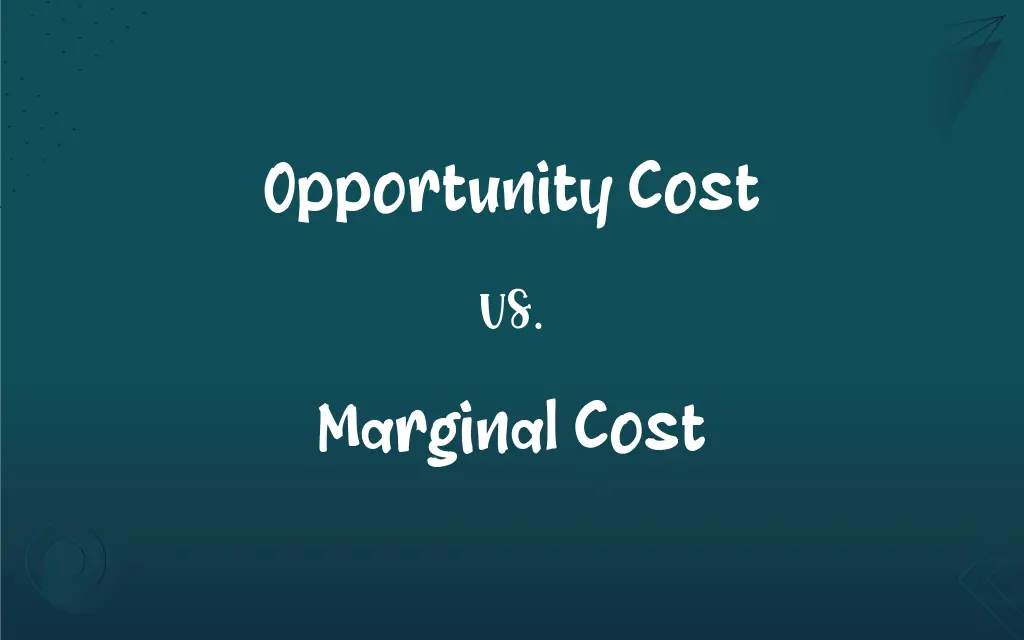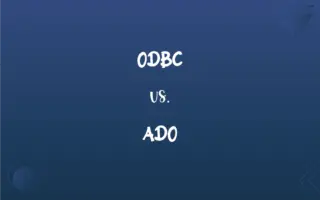Opportunity Cost vs. Marginal Cost: What's the Difference?
Edited by Aimie Carlson || By Janet White || Published on July 8, 2024
Opportunity cost is the loss of potential gain from other alternatives when one alternative is chosen, while marginal cost is the cost of producing one additional unit of a product.

Key Differences
Opportunity cost represents the benefits one misses out on when choosing one alternative over another, whereas marginal cost refers to the cost of producing one extra unit of a good or service.
Opportunity cost is a concept in economics that considers the next best alternative given up, contrasting with marginal cost, which focuses on the cost associated with the incremental increase in production.
Opportunity cost is not always quantifiable in monetary terms and often involves considering factors like time and resources, while marginal cost is typically quantified in terms of money.
In decision-making, opportunity cost is used to evaluate the potential benefits lost, whereas marginal cost is considered to determine the financial feasibility of increasing production.
Opportunity cost plays a crucial role in resource allocation and personal finance decisions, in contrast, marginal cost is essential in production and pricing strategies in business.
ADVERTISEMENT
Comparison Chart
Definition
Lost potential gain from other alternatives
Cost of producing an additional unit
Economic Focus
Alternative choices and their value
Incremental production cost
Quantification
Not always in monetary terms
Typically measured in monetary terms
Usage in Decision-Making
Evaluating benefits lost
Assessing cost of increased production
Relevance
Resource allocation, personal finance
Business production, pricing strategies
ADVERTISEMENT
Opportunity Cost and Marginal Cost Definitions
Opportunity Cost
The loss of potential gain from other alternatives when one alternative is chosen.
Choosing to invest in stocks, the opportunity cost is the interest foregone from not keeping the money in a savings account.
Marginal Cost
The additional cost of increasing product output or service provision.
The marginal cost of serving one more customer in a restaurant is the cost of food and extra service.
Opportunity Cost
The cost associated with missed opportunities when a decision is made.
Hiring a new employee has an opportunity cost of the other candidates not chosen.
Marginal Cost
The incremental cost associated with producing one more unit of a good.
Manufacturing another pair of shoes incurs a marginal cost of $20 in materials and labor.
Opportunity Cost
The benefit one forgoes by choosing one option over another.
The opportunity cost of spending money on vacation is the investment opportunities missed.
Marginal Cost
The cost incurred by producing one additional unit of a product.
If producing an extra widget costs $5, that's the marginal cost.
Opportunity Cost
A measure of an economic choice in terms of the best alternative given up.
The opportunity cost of attending college is the income one could have earned working full-time.
Marginal Cost
The cost of an increase in total production.
Adding another batch of cookies increases baking costs by $10, representing the marginal cost.
Opportunity Cost
The cost of the next best alternative foregone.
Spending time watching a movie has an opportunity cost of not studying for an exam.
Marginal Cost
A concept in economics relating to the cost of increasing production output by one unit.
The marginal cost of printing an additional book in a publishing house.
FAQs
Can opportunity cost be measured in money?
Sometimes, but it often includes non-monetary factors like time or resource allocation.
What is opportunity cost?
It's the loss of potential gain from other alternatives when choosing one option.
How is marginal cost defined?
Marginal cost is the cost of producing one additional unit of a product.
Why is opportunity cost important in decision-making?
It helps in understanding the true cost of a decision by considering what is given up.
What factors influence marginal cost?
Material, labor, and overhead costs influence marginal cost.
Is opportunity cost always a financial consideration?
No, it can also involve time, convenience, or other non-financial factors.
Do individuals face opportunity costs?
Yes, every choice made involves an opportunity cost.
Does marginal cost change with production volume?
Yes, it often varies depending on the scale of production.
What is the relationship between marginal cost and supply?
Marginal cost helps determine the supply curve in economics.
How does opportunity cost impact investments?
It affects investment decisions by comparing potential returns from different options.
Why might marginal cost increase?
Due to increased resource prices or inefficiencies at higher production levels.
Is opportunity cost relevant in personal finance?
Yes, especially in spending, saving, and investing decisions.
How does marginal cost affect pricing?
Businesses use marginal cost to determine the minimum price at which a product can be sold profitably.
Is marginal cost relevant for small businesses?
Yes, it's critical for understanding the costs of scaling up production.
Can opportunity cost lead to regret?
Potentially, if the foregone alternative turns out to be more beneficial.
Can marginal cost decrease with increased production?
Initially, it might, due to economies of scale, but it can increase after reaching a certain point.
How do businesses calculate opportunity cost?
By evaluating the benefits of the next best alternative that is not chosen.
Is marginal cost the same for all products?
No, it varies depending on the product, industry, and production methods.
Can marginal cost be negative?
Typically no, as it represents additional costs, not savings.
How does opportunity cost affect resource allocation?
It guides how resources are distributed among different options.
About Author
Written by
Janet WhiteJanet White has been an esteemed writer and blogger for Difference Wiki. Holding a Master's degree in Science and Medical Journalism from the prestigious Boston University, she has consistently demonstrated her expertise and passion for her field. When she's not immersed in her work, Janet relishes her time exercising, delving into a good book, and cherishing moments with friends and family.
Edited by
Aimie CarlsonAimie Carlson, holding a master's degree in English literature, is a fervent English language enthusiast. She lends her writing talents to Difference Wiki, a prominent website that specializes in comparisons, offering readers insightful analyses that both captivate and inform.







































































